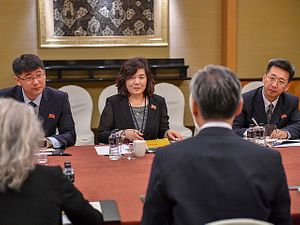Early last month, U.S. President Donald J. Trump and North Korean leader Kim Jong-un met for a summit in Singapore.
The first U.S.-North Korea Summit since the establishment of North Korea in 1948 had two focal points. The first was issues concerning North Korea’s abolition of nuclear weapons. The other was the end of the Korean War, which began in 1950, and how to construct a system for subsequently stabilizing the Korean Peninsula. These two points appear at first blush to be fundamentally different, but they are in fact two sides of the same coin to North Korea, which is becoming increasingly isolated from the international community. This is because the possession of nuclear weapons is a measure with which North Korea can counter the U.S.-South Korea alliance after the Korean War, especially the United States, and maintain its regime.
The focus of the summit was on how far the two sides would go in proposing specific concessions. That is, the focus for the North Korean side was specific roadmaps for abolishing nuclear weapons, and the focus for the U.S. was specific measures related to providing Pyongyang with security guarantees. North Korea is on the horns of a dilemma, namely that if it gives up its weapons of mass destruction without effective measures for securing security guarantees and the United States suddenly reverses course and steps up its pressure, North Korea will be facing that pressure without its countermeasures. This explains why Pyongyang reacted so sensitively to National Security Adviser John Bolton’s proposal about the Libya model in the process of negotiations.
The United States demands that North Korea implement “complete, verifiable and irreversible denuclearization (CVID),” whereas North Korea, so to speak, demands that the United States provide it with a “complete, verifiable and irreversible security arrangement (CVISA).”
The international community has considerable experience with CVID. But what of CVISA? How can it be provided specifically? If a country has actually given up its nuclear weapons and its nuclear weapons program, it is not easy to restart them. Accordingly, a country that has promised to stop possessing weapons of mass destruction can tend to become skeptical during the process of negotiations and eventually drop out. Negotiations with North Korea to relinquish its nuclear weapons failed, and not just because North Korea is an autocratic, slippery regime.
The specific measures of CVISA that the international community, including the United States, can provide to North Korea, which is skeptical that the international community will immediately crush it, are limited. In fact, the Libya model demonstrated that restoring relations and lifting economic sanctions are no guarantee of a regime’s survival. It is also unclear how the conclusion of nonaggression pacts between the United States and North Korea would be implemented, as military pressure and economic sanctions can be restored even if they are once stopped.
Realistically, there are just two ways to make a country like North Korea give up its weapons of mass destruction. The first is to do so by force, if negotiations fail. This is the direction that the United States and its allies took in the past. They expanded the scope of sanctions and pressure on North Korea, making effective use of the United Nations. They finally succeeded in getting not only the UN involved, but also China and Russia, traditionally close allies of Pyongyang. If North Korea shifted to a policy to appeasement this year because of its economic predicament, then it might be argued that these efforts produced results.
There is, however, another perspective: Namely, that North Korea decided to negotiate with the United States not because of sanctions, but because it had finished developing its nuclear weapons and had demonstrated their capability. Even if sanctions have been effective, the post-summit situation is very different. Trump proudly proclaimed the meeting a success and announced that the U.S. would cancel its military exercises with South Korea. Meanwhile, China and South Korea have already suggested that they may ease sanctions. The economic pressure on North Korea is likely to ease.
As such, sanctions alone are unlikely to prompt North Korea to implement CVID. That leaves the U.S. and the rest of the international community with just one realistic course of action. It must convince a highly skeptical North Korea to have faith. For this to happen, the international community must negotiate diligently with North Korea, through a series of small agreements.
Will the United States work to build trust with North Korea? This is the path it must follow, with the cooperation of the international community. Can Trump, who scrapped the Iran nuclear agreement even as he was negotiating with North Korea, endure that process? There seems to be a long path ahead for a short-tempered president who has opened the Pandora’s box of negotiations with North Korea.
Kan Kimura is a professor at Kobe University.

































